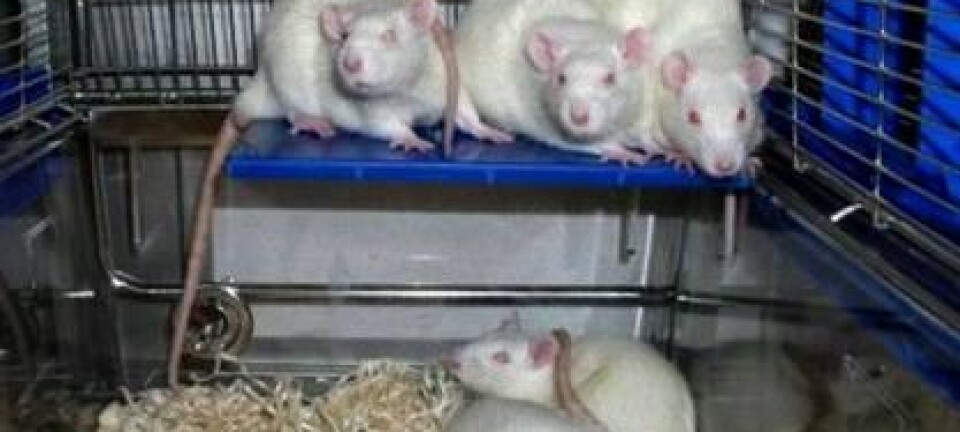
Denmark moves to ban bestiality -- but is sex with animals really so bad?
Is bestiality harmful to the animals? Not always, say Danish researchers and point to the fact that animals seem to enjoy sex and orgasms.
Bestiality could soon be illegal in Denmark.
While the country has long been a member of an exclusive handful of European countries still allowing the practice of having sex with animals, international pressure citing animal welfare is now putting a stop to that.
Earlier this week Minister of Food and Agriculture Dan Jørgensen announced his plans to amend the Animal Welfare Act for next year. “I have decided we should ban sex with animals,” he told the Danish newspaper Ekstra Bladet.
Sweden, Norway, and Germany have all banned bestiality, leading to an increase in underground animal sex tourism in Denmark -- which in turn has hurt the country’s international reputation.
Jørgensen indicated the latter was a factor in the decision but stressed that “the most important is that in the vast majority of cases it’s an attack against the animals”.
But is it really so?
Scientists from the University of Copenhagen digress.
It’s all a matter of proportions: scientist
In a literary review, the scientists have attempted to uncover what people actually do when they have sex with animals, why they do it, and if the interspecies intercourse really is that bad for the animals.
The review provides no clear answers but does suggest that bestiality within certain limits can lead to pleasure, perhaps even a better life, for the animals.
“Obviously, the proportions have to be in check,” says Ph.D. Stine B. Christiansen, University of Copenhagen and The Danish Council for Animal Ethics. “It’s hard to imagine a hen staying intact after penetration -- and that’s a problem.”
“But if we’re talking about a larger animal, like a horse or a cow, then it’s just as difficult to imagine the animal would be hurt by a man penetrating it,” she says.
Sex can be a positive experience for the animal
The review did reveal that most bestiality, or zoophilia, goes beyond simply penetrating the animal.
Some people enjoy the animal penetrating them, others the act of performing oral sex on the animal.
Would the animal suffer from such activities? Probably not, says Christiansen. “It might actually be a positive experience for the animal. It’s even possible the animal doesn’t perceive it as something sexual but rather as a social act -- which doesn’t arouse it.”
Other examples of bestiality include helping the animal to orgasm -- for example by using the hands. Research show some animal owners see this kind of sexual stimulation as a natural way of caring for their pet.
In other words: people pleasure their pets, not because it arouses them personally but because they believe it makes the animal happy.
“It can be discussed if it’s an act of caring or an activity the animals actually lack [because they live alone with humans],” says Christiansen. “But there’s nothing in the literature that supports the idea that the animals necessarily suffer from all kinds of sexual activities.”
Professor: sex is pleasure, not reproduction
Christiansen completed her first literary review of bestiality in 2006 when she was collecting material for a hearing in the Danish Parliament.
The legality of bestiality has been on the parliament’s legislative agenda many times but has consistently been voted down.
Professor Björn Forkman from the University of Copenhagen’s section for animal welfare and disease control has also reviewed the literature. He says it’s a common belief that animals only have sex to reproduce -- but this is wrong.
“Hand on your heart, how often do you have sex solely for the sake of reproduction?” says Forkman. “The truth is we have sex because it feels good.”
According to him the same could be true for animals.
“There are countless of examples of animals that masturbate: dolphins and whales have sex with each other in the blowholes and quite a lot of species practice anal sex,” he says.
Forkman refers to the book “Biological Exuberance” by biologist Bruce Bagemihl which describes homosexual tendencies within at least 300 species, including beetles, snakes, elephants, dogs, and cats. “It shows that the animals have sex because they want to and not because they hope to produce offspring.”
It’s quite probable that cows can experience orgasms, says Forkman, arguing that sex is probably as natural for animals as it is for humans. “Perhaps even so natural that I find it unnatural how we can’t talk about it without being met by harsh reactions.”
What is natural or unnatural?
In a separate study Christiansen looked at how our acceptance of bestiality evolved throughout the years. Turns out, it changed quite a lot.
For a long time bestiality was compared to homosexuality, which is still seen as an unnatural act by some people, and other paraphilia. Religion also condemned it as sex outside the purpose of reproduction was wrong. But the welfare of the animals was never the issue.
Today it’s a little different, with the animals’ safety being the main concern.
Still, the lines for what’s acceptable seem to be quite randomly drawn, says Christiansen.
Why, for example, is it acceptable that a dog can lick its owner’s mouth, hand or feet but not other areas? Or why is it OK to ride on a horse but not let it ride you? It’s not natural for a horse to carry a rider; but sexual intercourse is.
If the animal expresses normal behaviour does it then matter if the act takes place under natural or manmade conditions?
Christiansen stresses that her scientific work isn’t about provoking or forcing an opinion on people -- it’s about facilitating an informed basis for future discussions on the questions the bestiality debate raises about humankind’s relations to animals.
What do you think? Feel free to let us know in the comment section below.
----------
Read the original article in Danish on Videnskab.dk
Translated by: Kristian Secher









